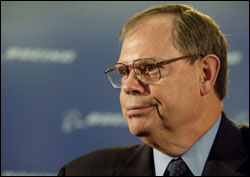In a famous 1982 lecture about founding father Thomas Jefferson, noted historian Jeffrey Spicoli, a libertarian if ever there was one, observed that Americans like to think for themselves: “So, like, when Jefferson went before the people, what he was saying was, ‘Hey, we left this place in England because it was bogus, and if we don’t come up with some cool rules ourself, we’ll be bogus, too!'”
Today, America is bogus, too. How we got from Jefferson to Bush 43 is a long story, but even in the short period since Spicoli’s gnarly words in Fast Times at Ridgemont High, the rules have changed.
Not thinking for ourselves, we are nonetheless happy to think for others. At a time when ideas flow more freely than ever and dialogue with the entire planet is fast, we strive for ideological conformity. Every opinion must fall on one side or the other of a holy trench war. There is no safe middle ground. Venture there and you will draw friendly fire. It doesn’t make for good democracy, but those are the rules now.
“Support our troops” is code for “support the president’s and the Pentagon’s policies.” We define religious freedom by the extent to which the government embraces and promotes our particular faith and interests, in the homeland and elsewhere. Activist government, though, is good only when it enforces ideology. If you or your kind have problems, you’re on your own, to thrive or suffer as you can. ‘Tis God’s will.
On the other side, they say the burden of big government is a small price to pay for the comfort it affords the afflicted and the safety it imposes on all of us. How dare we demand efficiency and accountability? Liberals shall support abortion no matter what (and conservatives shall oppose it). If you are progressive, do not fly the American flag. Someone might get the wrong idea.
No matter which of the two parties you favor—and there are only two—stray not from your side’s platform. And when challenging the other side, hollering and name-calling is the best approach because civility shows weakness. That much everyone can agree on, unfortunately. None of this makes for good democracy, but those are the rules now.
Closer to home, the manifestations of bogusness are largely economic. Local corporations seem to have more rights than people and get all the breaks. In Washington, where there is no state income tax, the less money you make or have, the greater the proportion of that “wealth” you will send to Olympia, because the state sales tax is 6.5 percent. The more real estate you own, the better you can afford to influence and profit from a location, and yet you still will get concessions from politicians eager to pay for amenities that will benefit you, whether you are a billionaire or a millionaire—equal opportunity! It doesn’t make sense, but those are the rules. Thrive or suffer as you can.
For those of us laboring to bring this sort of bogus bipolar civics to your attention, there is no rest. The government doesn’t want to tell us—and, by extension, you—anything.
Apparently, elected officials and civil servants take an oath of secrecy. We filed a public records request to see what the oath says, but it is exempt from disclosure under the law because it involves real, potential, or imagined litigation. Speaking of which, litigation is what we have to threaten if we are to gain access to the most innocuous of government documents. It’s getting to be expensive to report on government. You have to hire a lawyer. So most news outlets just don’t bother. Businesses sometimes are better about talking to the media than government, though the odds are usually greater that they will be lying. Tragically, this surprises no one.
It’s sometimes not expensive to report stuff we think our readers should know, but it’s a crapshoot. Just last week, a lawyer wrote to tell us we had defamed a couple of people we had mentioned in a story and that they might sue if we didn’t retract what we wrote about them. Suing so we can report the news, and defending against lawsuits after we do report the news, doesn’t make for good democracy, but those are the rules these days.
I guess I can deal with most of these rules on most days, though I’d feel better if they were written down somewhere. But I find the new rules of engagement among people particularly troubling, and I’m not sure what we can do about them. On March 31, Chicago Tribune public editor Don Wycliff put it pretty well in reflecting on five years in his job. “[T]he most notable change I’ve seen,” he wrote, “is the willingness of people—readers, commentators, activists, everybody—to eschew humility and display what can only be called unabashed moral and intellectual arrogance.”
Arrogance is a sign of not knowing what you don’t know. It breeds meanness and general disregard. These traits are antithetical to democracy. They’re bogus. But today they rule, because we let them. Which means we’re bogus, too.
The real Mossback, Knute Berger, is on vacation.






